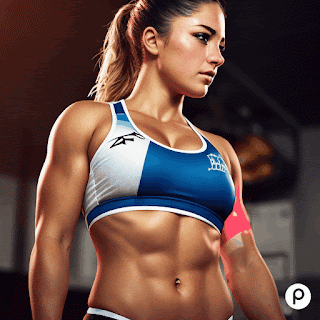Functional Nutrition 101: Daily Nutrient Needs, Health Bars, and Wellness
Functional Nutrition 101: Daily Nutrient Needs, Health Bars, and Wellness
Functional foods and bars are products that are designed to provide specific health benefits beyond their basic nutritional value. They contain ingredients that have been scientifically proven to improve overall health and well-being. Functional foods and bars for athletes are specifically formulated to meet the unique nutritional needs of individuals who engage in intense physical activity.
Athletes have higher energy requirements and nutrient needs than the average person. Functional foods and bars can help athletes meet these needs and improve their athletic performance. They can also help to reduce the risk of injury and improve overall health. Functional foods and bars for athletes are convenient and easy to consume, making them an ideal choice for athletes who need quick and efficient sources of nutrition.
Nutritional Needs of Athletes
A. Macronutrients
Carbohydrates:
Carbohydrates are the primary source of energy for athletes. They are essential for providing the body with the energy needed to perform intense physical activity. Athletes should consume adequate amounts of carbohydrates to maintain their glycogen stores and prevent fatigue.
Proteins:
Proteins are essential for building and repairing muscle tissue. Athletes require higher amounts of protein than the average person to support muscle growth and repair. Protein is also important for the immune system, as it helps to produce antibodies that fight off infections.
Fats:
Fats are an important source of energy for athletes, especially during prolonged exercise. They are also important for the absorption of fat-soluble vitamins and the production of hormones.
B. Micronutrients
Vitamins:
Vitamins are essential for various metabolic processes in the body. Athletes require higher amounts of certain vitamins, such as vitamin C and B vitamins, due to increased energy demands and losses through sweat.
Minerals:
Minerals are essential for maintaining electrolyte balance and various metabolic processes in the body. Athletes require higher amounts of certain minerals, such as sodium, potassium, and magnesium, due to losses through sweat during exercise.
Benefits of Functional Foods and Bars for Athletes
A. Improved Performance
Energy:
Functional foods and bars for athletes can provide a quick and efficient source of energy, especially during intense physical activity. They contain carbohydrates, which are essential for maintaining glycogen stores and preventing fatigue.
Endurance:
Functional foods and bars for athletes can improve endurance by providing sustained energy throughout a workout or competition. They can also help to delay muscle fatigue and improve performance.
Recovery:
Functional foods and bars for athletes can help to speed up recovery after exercise by providing the necessary nutrients to repair muscle tissue and replenish energy stores.
B. Enhanced Health
Reduced Risk of Injury:
Functional foods and bars for athletes can help to reduce the risk of injury by providing the necessary nutrients for bone and muscle health. They can also help to prevent muscle cramps and other injuries.
Improved Immune System:
Functional foods and bars for athletes can help to boost the immune system, which is often compromised during intense physical activity. They contain vitamins and minerals that are essential for immune function.
Decreased Inflammation:
Functional foods and bars for athletes can help to reduce inflammation in the body, which can improve overall health and well-being. They contain antioxidants and anti-inflammatory ingredients that can help to reduce inflammation and prevent chronic disease.
Types of Functional Foods and Bars for Athletes
A. Pre-Workout
Energy Bars:
Energy bars contain carbohydrates, protein, and fats to provide sustained energy during physical activity. They are an easy and convenient way to fuel up before a workout.
Sports Drinks:
Sports drinks contain electrolytes and carbohydrates to provide hydration and energy before a workout. They are an ideal choice for athletes who need to stay hydrated during intense physical activity.
Protein Shakes:
Protein shakes contain high-quality protein to support muscle growth and repair. They are an ideal choice for athletes who need to build and repair muscle tissue before a workout.
B. During Workout
Electrolyte Replacement Drinks:
Electrolyte replacement drinks contain sodium, potassium, and other electrolytes to replace fluids lost through sweat during physical activity. They are an ideal choice for athletes who need to stay hydrated and maintain electrolyte balance during a workout.
Energy Gels:
Energy gels contain carbohydrates and electrolytes to provide a quick source of energy during physical activity. They are easy to consume and digest, making them an ideal choice for athletes who need quick and efficient sources of energy.
Sports Chews:
Sports chews contain carbohydrates and electrolytes to provide a quick source of energy during physical activity. They are an ideal choice for athletes who need sustained energy and easy-to-consume nutrition.
C. Post-Workout
Recovery Bars:
Recovery bars contain protein and carbohydrates to support muscle growth and repair after physical activity. They are an ideal choice for athletes who need to replenish their energy stores and repair muscle tissue after a workout.
Protein Bars:
Protein bars contain high-quality protein to support muscle growth and repair after physical activity. They are an ideal choice for athletes who need to build and repair muscle tissue after a workout.
Smoothies:
Smoothies contain a combination of carbohydrates, protein, and other nutrients to support muscle growth and recovery after physical activity. They are an ideal choice for athletes who need a quick and convenient way to replenish their energy stores and repair muscle tissue.
Choosing Functional Foods and Bars for Athletes
A. Nutrient Density
Athletes should choose functional foods and bars that are nutrient-dense, meaning they contain a high amount of vitamins, minerals, and other beneficial nutrients. This will ensure that they are getting the most nutrition possible from their food choices.
B. Ingredients
Athletes should look for functional foods and bars that contain high-quality ingredients, such as whole grains, lean proteins, and healthy fats. They should avoid processed and artificial ingredients as much as possible.
C. Taste and Texture
Athletes should choose functional foods and bars that they enjoy eating, as this will make it more likely that they will stick to their nutrition plan. They should also consider the texture of the food or bar and choose options that are easy to eat during physical activity.
D. Convenience and Portability
Athletes should choose functional foods and bars that are easy to transport and consume during physical activity. They should look for options that are easy to pack and can be eaten quickly, without the need for preparation.
Conclusion
Functional foods and bars can provide numerous benefits for athletes, including improved performance, enhanced health, and faster recovery times. By incorporating these foods into their diet, athletes can improve their overall nutrition and achieve their fitness goals.
Functional Foods and Bars into their Diet: Athletes should prioritize their nutrition and make a conscious effort to choose functional foods and bars that support their physical activity. By making small changes to their diet, athletes can see big improvements in their performance and overall health.







